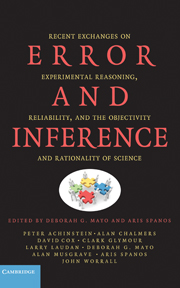 Error and Inference
Error and Inference Book contents
- Frontmatter
- Contents
- List of Contributors
- Preface
- Introduction and Background
- 1 Learning from Error, Severe Testing, and the Growth of Theoretical Knowledge
- 2 The Life of Theory in the New Experimentalism
- 3 Revisiting Critical Rationalism
- 4 Theory Confirmation and Novel Evidence
- 5 Induction and Severe Testing
- 6 Theory Testing in Economics and the Error-Statistical Perspective
- 7 New Perspectives on (Some Old) Problems of Frequentist Statistics
- 8 Causal Modeling, Explanation and Severe Testing
- 9 Error and Legal Epistemology
- Index
- References
2 - The Life of Theory in the New Experimentalism
Published online by Cambridge University Press: 29 January 2010
- Frontmatter
- Contents
- List of Contributors
- Preface
- Introduction and Background
- 1 Learning from Error, Severe Testing, and the Growth of Theoretical Knowledge
- 2 The Life of Theory in the New Experimentalism
- 3 Revisiting Critical Rationalism
- 4 Theory Confirmation and Novel Evidence
- 5 Induction and Severe Testing
- 6 Theory Testing in Economics and the Error-Statistical Perspective
- 7 New Perspectives on (Some Old) Problems of Frequentist Statistics
- 8 Causal Modeling, Explanation and Severe Testing
- 9 Error and Legal Epistemology
- Index
- References
Summary
Introduction
Deborah Mayo's “error-statistical” account of science and its mode of progress is an attempt to codify and capitalise on the “new experimentalist” approach to science that has made its appearance in the past few decades as an alternative to “theory-dominated” accounts of science. Rather than understanding scientific progress in terms of the replacement of one large-scale theory by another in the light of experiments designed to test them, new experimentalists view progress in terms of the accumulation of experimental discoveries and capabilities established independently of high-level theory. The new experimentalists aspire to an account of science and its mode of progress that evades problems associated with the theory dependence of observation, the underdetermination of theories by evidence, the Duhem problem and incommensurability that have beset the theory-dominant approach. Here is how Mayo (this volume, p. 28) herself characterizes the situation:
Learning from evidence, in this experimentalist philosophy, depends not on appraising large-scale theories but on local experimental tasks of estimating backgrounds, modeling data, distinguishing experimental effects, and discriminating signals from noise. The growth of knowledge has not to do with replacing or confirming or probabilifying or ‘rationally accepting’ large-scale theories, but with testing specific hypotheses in such a way that there is a good chance of learning something – whatever theory it winds up as part of.
Central to Mayo's version of the new experimentalism is her notion of a severe test.
- Type
- Chapter
- Information
- Error and InferenceRecent Exchanges on Experimental Reasoning, Reliability, and the Objectivity and Rationality of Science, pp. 58 - 87Publisher: Cambridge University PressPrint publication year: 2009
